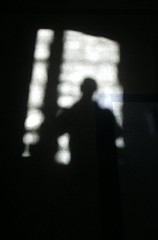From behind 1.06

Exploring "the zone". In Tarkovsky's film a Stalker is a guide into the forbidden area. The zone was rendered unpredictable, hazardous and "metaphysical" following "the visit". Based on the novel Roadside Picnic by the Strugatzki brothers.
While American cinema stages its apocalyptic fantasy time and again (Matrix, Terminator, Lord of the Rings, Planet of the Apes - only to mention the trilogies), its imagination never reaches beyond the apocalyptic moment and climax. The end is averted or takes place in the off, audiences soothed by voice-overs and soundtracks. Or a cyclical image of mankind is drawn, with survivors "starting over" in an Edenic state where pre- and post-civilization become one. Or the genre of the Robinsonade is invoked, hardly explored. Always the restitutive drive rights the eschatological momentum and resets narrative spacetime: survivors in tabula rasa, audiences released without ambivalence, ready to restart their newly discovered -they forgot!- precious lifes afresh. The affirmative character of culture. The closer to the edge, the more intimate the anticipation of the abyss, the stronger the affirmation (?)
While American cinema stages its apocalyptic fantasy time and again (Matrix, Terminator, Lord of the Rings, Planet of the Apes - only to mention the trilogies), its imagination never reaches beyond the apocalyptic moment and climax. The end is averted or takes place in the off, audiences soothed by voice-overs and soundtracks. Or a cyclical image of mankind is drawn, with survivors "starting over" in an Edenic state where pre- and post-civilization become one. Or the genre of the Robinsonade is invoked, hardly explored. Always the restitutive drive rights the eschatological momentum and resets narrative spacetime: survivors in tabula rasa, audiences released without ambivalence, ready to restart their newly discovered -they forgot!- precious lifes afresh. The affirmative character of culture. The closer to the edge, the more intimate the anticipation of the abyss, the stronger the affirmation (?)
Elsewhere cinema has crossed this threshold of the imagination without the above social engineering thrust. Japanese anime and the Godzilla films are the self-evident examples. But Stalker does not follow these action scripts. Characters, and civilization, appear in stasis. The restitutive drive is arrested. And ambivalence prevails. Morality appears lost and impossible to recover. No machines or monsters to vanquish, no agent with anti-human fixation appears, no ready target to cathect violence and thus no generic closure with the clean slate are available.


0 Comments:
Post a Comment
<< Home